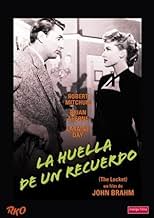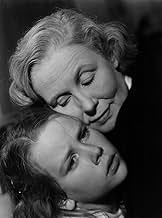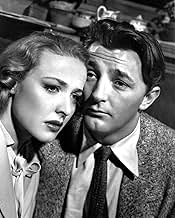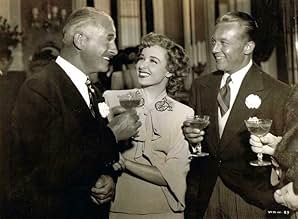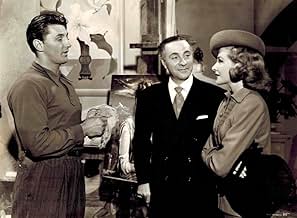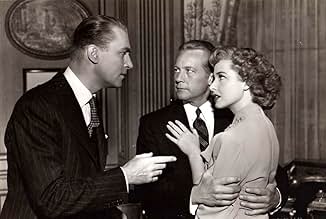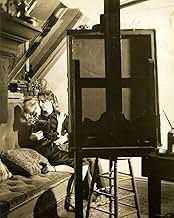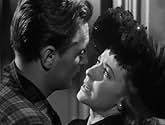IMDb RATING
7.1/10
3.4K
YOUR RATING
Just before his wedding, the bridegroom hears a complex tale painting his lovely bride as devilish and unbalanced.Just before his wedding, the bridegroom hears a complex tale painting his lovely bride as devilish and unbalanced.Just before his wedding, the bridegroom hears a complex tale painting his lovely bride as devilish and unbalanced.
- Awards
- 4 wins total
- Director
- Writers
- All cast & crew
- Production, box office & more at IMDbPro
Featured reviews
Brahm's intricately constructed film is based on the obvious conceit of a locket: in psychoanalytical terms, it symbolises repressed memory and of the 'opening up' of hidden psychosis. In a filmic sense of course, The Locket itself is a cinematic 'locket', the flashbacks within flashback structure reflecting the secret enclosure typical of such a piece of jewellery.
In fact I can't think of another film that takes this much commented narrative technique to such extremes. Mitchum of course was well used to playing heros faced with abnormal feminine psychology. He faces similar femme fatales in Preminger's 'Angel Face' for instance and in Farrow's 'Where Danger Lives' - all made at around the same time (end 40's, start of 50's). This may reflect something of the obsession that Hollywood had with cod Freudianism just as much as noir convention, but there is no doubting that Mitchum's peculiar manner as an actor, his doe-eyed sleep-walking acting style, made his starring excursions into the dangers of the subconscious peculiarly effective.
Brahm, one of Hollywoods most neglected directors at least for the work that he did at this time in his career, makes the somewhat over- stretched structure of the film work, pun intended, like a dream. Nancy's final walk to the altar, immediately before her mental and psychic collapse, although necessarily melodramatic, is very effective version of a personal calvary and she seems stunned and trance like. In retrospect, of course, it is easy to see how the whole of the preceding film has been leading up to this sequence, (just as how the flashback structure of the film reminds one in passing of 'Citizen Kane') but the sound and vision montage is still powerful.
By setting the bulk of the film in flashback, Brahm places it in the past - or, more precisely, in the imaginatively reconstructed past, and it is this dream-sense that retains a powerful grip on the viewer as events unfold. This almost hallucinatory sense, together with a feeling of 'drifting with fate', marks out some of the greatest noirs and B-mysteries made at this time and is what makes this film still very watchable today.
A 'Locket' well worth looking into.
In fact I can't think of another film that takes this much commented narrative technique to such extremes. Mitchum of course was well used to playing heros faced with abnormal feminine psychology. He faces similar femme fatales in Preminger's 'Angel Face' for instance and in Farrow's 'Where Danger Lives' - all made at around the same time (end 40's, start of 50's). This may reflect something of the obsession that Hollywood had with cod Freudianism just as much as noir convention, but there is no doubting that Mitchum's peculiar manner as an actor, his doe-eyed sleep-walking acting style, made his starring excursions into the dangers of the subconscious peculiarly effective.
Brahm, one of Hollywoods most neglected directors at least for the work that he did at this time in his career, makes the somewhat over- stretched structure of the film work, pun intended, like a dream. Nancy's final walk to the altar, immediately before her mental and psychic collapse, although necessarily melodramatic, is very effective version of a personal calvary and she seems stunned and trance like. In retrospect, of course, it is easy to see how the whole of the preceding film has been leading up to this sequence, (just as how the flashback structure of the film reminds one in passing of 'Citizen Kane') but the sound and vision montage is still powerful.
By setting the bulk of the film in flashback, Brahm places it in the past - or, more precisely, in the imaginatively reconstructed past, and it is this dream-sense that retains a powerful grip on the viewer as events unfold. This almost hallucinatory sense, together with a feeling of 'drifting with fate', marks out some of the greatest noirs and B-mysteries made at this time and is what makes this film still very watchable today.
A 'Locket' well worth looking into.
Yes! This is the movie that does just that - but it's worth watching for more than that. It is an inspired piece of film-making with excellent direction and fine photography. It also features some strong performances especially from the (is she or isn't she evil) Laraine Day, and the wonderful Brian Aherne. And Robert Mitchum's pretty good too. The best bits are almost expressionist - especially the music box shots - and it's full of the pseudo psychological nonsense that Hollywood loved so much in this era. Highly enjoyable.
Knowing that this is the movie with the famous "flashback within a flashback within a flashback" draws people in, but the device never comes across as forced or artificial, and it works.
Like a lot of other people, I think Leonard Maltin underrates this one. "The Locket" is fun and suspenseful, as all "did she or didn't she" stories are when they're told right. This is Laraine Day's finest hour, and Robert Mitchum is very good in a sympathetic role. They are ably supported by Brian Aherne and Gene Raymond.
It's nice to see so many of the wonderful old thrillers from the 40s enjoying a revival. So many little gems like "The Locket" come in at under 90 minutes; they benefit from tight writing, intriguing premises and neat plot twists. Like "Detour," "Phantom Lady," "Follow Me Quietly" and many others, "The Locket" does not disappoint.
This is the kind of movie you think about all day long, and maybe the day after, if you happen upon it at 3:00 a.m. on TCM.
Like a lot of other people, I think Leonard Maltin underrates this one. "The Locket" is fun and suspenseful, as all "did she or didn't she" stories are when they're told right. This is Laraine Day's finest hour, and Robert Mitchum is very good in a sympathetic role. They are ably supported by Brian Aherne and Gene Raymond.
It's nice to see so many of the wonderful old thrillers from the 40s enjoying a revival. So many little gems like "The Locket" come in at under 90 minutes; they benefit from tight writing, intriguing premises and neat plot twists. Like "Detour," "Phantom Lady," "Follow Me Quietly" and many others, "The Locket" does not disappoint.
This is the kind of movie you think about all day long, and maybe the day after, if you happen upon it at 3:00 a.m. on TCM.
Just before his wedding to the beautiful and carefree Nancy, John Willis is visited by Doctor Harry Blair who informs him that he knows the real Nancy and warns the doctor not to make the same mistake as him by marrying her. He tells her the story of how he had just married Nancy when a man called Clyde turned up in his office and told him a story about how he had met Nancy and had got drawn into her world of deception.
Shunning conventional structure is always a risk and in this film it is one that it takes as we have a story being told by Blair that is basically about him being told a story by Clyde. This makes for an interesting approach especially since the stories are both told by her dumped lovers. In this regard we're not sure what is true and what isn't and, while the stories engage on one level, I was conscious of the fact that they were telling and not necessarily facts (a trick Usual Suspects would later repeat to great praise). Existing within the minds of the characters, the story is interesting and is all the better at the end for it. For many viewers the story-telling approach will be a little slow and I times it did drag a bit but mostly it comes together and works as something different and interesting.
The cast are roundly good although they take second fiddle to the script and the ideas of director Brahm (who produces some clever ideas in Nancy's bridal march). Aherne is a bit too stiff in the role where really I wanted him to display a bit more range. Mitchum is good in his role but it wasn't the sort of thing I was used to seeing him in and he has been much better elsewhere. Day takes the main role of Nancy and does well with it she is part of the reason we're not sure what is true and what isn't and she convinced me that she didn't know either. She has plenty of nice touches as well as one or two very strong moments. Like I said though, this wasn't a great actors film but nobody was less than good.
Overall this is an interesting and different film that takes a risk by stepping back to flashback within flashback but mostly pulls it off. The story format might be a little testing on the patience (hearing about something implies a lack of action in the time where we are after all the audience spent the film in the Willis study) but the material is worth it and, once back in the present, everything comes together nicely. Worth seeing for being a different style of drama from the period.
Shunning conventional structure is always a risk and in this film it is one that it takes as we have a story being told by Blair that is basically about him being told a story by Clyde. This makes for an interesting approach especially since the stories are both told by her dumped lovers. In this regard we're not sure what is true and what isn't and, while the stories engage on one level, I was conscious of the fact that they were telling and not necessarily facts (a trick Usual Suspects would later repeat to great praise). Existing within the minds of the characters, the story is interesting and is all the better at the end for it. For many viewers the story-telling approach will be a little slow and I times it did drag a bit but mostly it comes together and works as something different and interesting.
The cast are roundly good although they take second fiddle to the script and the ideas of director Brahm (who produces some clever ideas in Nancy's bridal march). Aherne is a bit too stiff in the role where really I wanted him to display a bit more range. Mitchum is good in his role but it wasn't the sort of thing I was used to seeing him in and he has been much better elsewhere. Day takes the main role of Nancy and does well with it she is part of the reason we're not sure what is true and what isn't and she convinced me that she didn't know either. She has plenty of nice touches as well as one or two very strong moments. Like I said though, this wasn't a great actors film but nobody was less than good.
Overall this is an interesting and different film that takes a risk by stepping back to flashback within flashback but mostly pulls it off. The story format might be a little testing on the patience (hearing about something implies a lack of action in the time where we are after all the audience spent the film in the Willis study) but the material is worth it and, once back in the present, everything comes together nicely. Worth seeing for being a different style of drama from the period.
I give full credit to this little treat for introducing me to the world of noir cinema when I happened to stumble onto it on AMC. (Oh, that AMC showed films of this caliber lately!) Laraine Day gives a beautifully understated performance, handling what would now perhaps be called a tragic case of posttraumatic stress disorder resulting in a life of twists and turns with truth, no scenery chewing. Brian Aherne strikes just the right clinical note as the sadder-but-wiser exhusband, and Robert Mitchum gives a memorable performance as the first (at least the first chronicled in this tale) man to fall victim to Nancy's fatal charms. As Norman, he certainly delivers a farewell present to Nancy's physician spouse, and by extension, to Nancy, that they won't soon forget. The denouement at the mansion while wedding guests await fair Nancy is gripping cinema. Watch for a great performance by the mother of Joan Fontaine and Olivia Dehaviland as the cruel woman responsible for Nancy's childhood trauma. Worth the while!
Did you know
- TriviaNorma Barzman's lengthy treatment for this film, which Sheridan Gibney revised into a screenplay, was inspired by a true event which was recounted to her by financier George Peabody Gardner and his sister Belle. When younger, the Gardners eschewed their aristocratic upbringing partly in reaction to an incident in their youth: As children they became friendly with the daughter of the family's housekeeper. It transpired that the daughter was wrongly accused of stealing a locket, leading to the firing and departure of the housekeeper and her daughter. Years later, they learned that the daughter suffered from depression and was implicated in a theft, a consequence for which the Gardners felt their family was partly responsible.
- GoofsAmerican ambulances, shown driven with left-hand drive, were not used in wartime London.
- Quotes
Norman Clyde: I don't take money for nothing. I'm not conducting a class so the parasitic rich can escape boredom. I'm not that hard up.
Nancy Patton: Well, I hope you never will be, Mr. Clyde. I admire your principles. I wish I could say the same for your disposition.
- ConnectionsEdited into Histoire(s) du cinéma: Fatale beauté (1994)
Details
- Runtime1 hour 25 minutes
- Color
- Aspect ratio
- 1.33 : 1
Contribute to this page
Suggest an edit or add missing content


